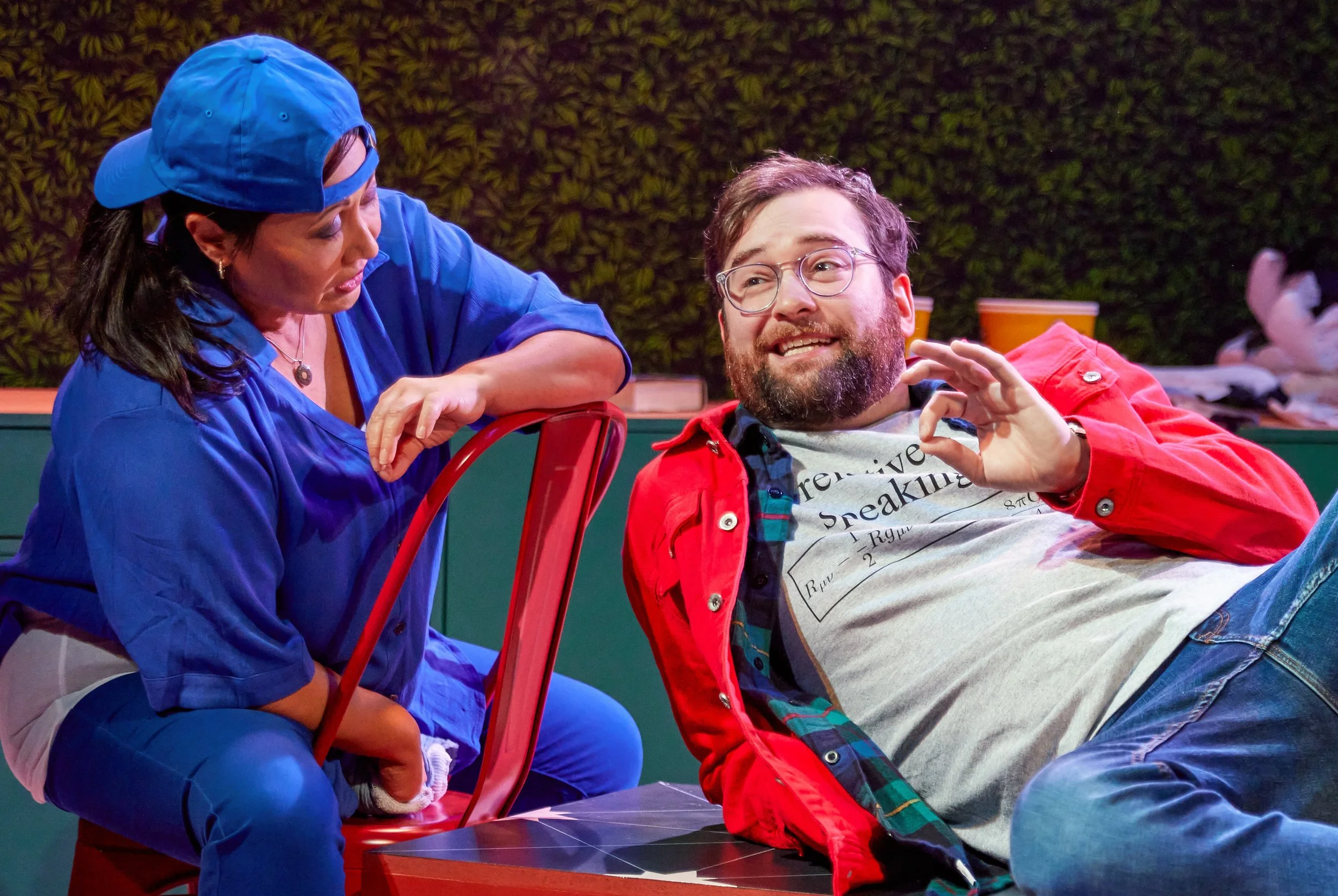Flashback to Meg (Brittany K. Allen, center) telling her friends (played by Eric R. Williams, left, and Bryn Carter, right) about her new boyfriend, in EST’s Redwood.
Drew Tatum, a character in Brittany K. Allen’s play Redwood, would never want to be one of those white people who says something like “I would have voted for Obama for a third term if I could”—that infamous line in Jordan Peele’s Get Out. During an uncomfortable encounter with a Black person, Drew does say, “The woman I love is Black. Oh, God, I swore I’d never say that to prove a point.”
Kate Siahaan-Rigg in one of her many roles, with Drew Lewis as Drew Tatum.
Drew (played by Drew Lewis) is referring to his live-in girlfriend, Meg, who’s portrayed by the playwright. Allen’s comedy-drama certainly offers a more optimistic view of interracial relationships than Get Out, though Meg and Drew are stunned to discover that their domestic bliss is not immune to race-related tensions. Thanks to some genealogical research by Meg’s uncle Stevie (Tyrone Mitchell Henderson), the couple learn that one of Drew’s forebears owned Meg’s enslaved ancestor Alameda—and fathered Alameda’s son, from whom Meg’s family is descended.
This is the type of news that a Black person and a white person—no matter how loving, open and honest their relationship—might react to differently. And that’s just what happens with Meg and Drew. He is shocked and horrified to learn that his family owned slaves, having never considered the implications of America’s racist history for him personally. Meg is shocked at his naivete and, if not horrified, at the very least annoyed by his acting like he was wronged.
“Sucks to your white fragility,” she says. “You don’t actually want to have a ‘real conversation,’ you just want me to rub your belly and say, ‘Don’t fret about slavery, you’re a good person, hot stuff,’ right?... You looking at me with your sad puppy dog eyes, like I personally orchestrated the end of your peace—or, I don’t know, like our whole lives just occurred to you—is not inspiring.”
“The playwright aims to strike a balance between, as she puts it in a program note, the absurd and heavy. ”
This scene and the less contentious ones between Meg and Drew do an excellent job of illuminating their personalities and their relationship as rooted in respect, affection and a shared intellectual curiosity. The other two-person scenes in Redwood are strong as well—one, when Stevie first meets Drew and tells him about their entwined family trees, is a finely played slow burn, and a couple of scenes between Meg and her mother (portrayed by Portia), though possibly a bit expository, have a nice cadence.
These naturalistic conversations contrast with musical interstitials involving a four-person ensemble in various roles that move at a fast, jokey pace and are interspersed with dialogue. The first such scene, at the top of the show, takes place during a hip-hop dance class that Stevie attends; the second, after he’s advised to try something easier, in prenatal yoga. While doing the exercises, Stevie narrates (for the audience) his emails to relatives about the genealogy project. Another bit speeds through a reenactment of key moments in Meg and Drew’s relationship. These episodes (choreographed by Sasha Hutchings) are amusing—a male actor is one of the pregnant yoga participants, complete with prosthetic belly—but can feel like Allen is trying too hard to juice up the proceedings.
Beverly (played by Portia, left) has some heart-to-hearts with her daughter, Meg (Allen). Photographs by Jeremy Daniel.
Just like Meg’s trying to laugh off the crazy coincidence of her and Drew’s lineage, the playwright aims to strike a balance between, as she puts it in a program note, the absurd and heavy. The upside is that the play isn’t a staid instructive; the downside is that the lightness in tone can be misconstrued for lightness in ideas. Yet Allen broaches some worthy points: about, for example, how even sympathetic white people cannot fully appreciate the legacy of racism, and how Black people might get complacent too. Listen to Meg’s mom romanticize their slave ancestors’ experience: “These kinda decent people took her in—you know what I mean, these kinda decent people bought her—and the master took a shine to our matriarch. ... They might have been star-crossed, lovers in the wrong time.” Later, Meg laments, “Our family basically denied our Blackness, and has moved mostly in white spaces, at great cost to our sense of connection.”
Allen has penned a domestic comedy with serious historical undertones, and her approach generally succeeds. Some parts of the story may be underdeveloped (marital discord between Meg’s parents, the gay Stevie’s romantic and professional past), but Redwood is enjoyable to watch and well-performed—kudos, especially, to the multitasking Eric R. Williams, Kate Siahaan-Rigg, Bryn Carter and Denny Dale Bess. And while the script allows that certain wrongs can never be righted, it resonates with optimism. It’s there in the title: According to Allen’s program note, the play is named in honor of those ancient trees’ resilience.
Redwood runs through Nov. 12 at Ensemble Studio Theatre (545 W. 52nd St.). Performances are at 7 p.m. Monday and Wednesday through Saturday; matinees are at 2 p.m. Saturday and 5 p.m. Sunday; ensemblestudiotheatre.org.
Playwright: Brittany K. Allen
Director: Mikhaela Mahony
Sets: Ao Li
Costumes: Mika Eubanks
Lighting: Betsy Chester and Stacey Derosier
Sound: Kathy Ruvuna





